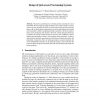Free Online Productivity Tools
i2Speak
i2Symbol
i2OCR
iTex2Img
iWeb2Print
iWeb2Shot
i2Type
iPdf2Split
iPdf2Merge
i2Bopomofo
i2Arabic
i2Style
i2Image
i2PDF
iLatex2Rtf
Sci2ools
105
click to vote
CORR
2010
Springer
2010
Springer
Design of QoS-aware Provisioning Systems
We present an architecture of a hosting system consisting of a set of hosted Web Services subject to QoS constraints, and a certain number of servers used to run users demand. The traffic is session-based, while provider and users agree on SLAs specifying the expected level of service performance such that the service provider is liable to compensate hist/her customers if the level of performance is not satisfactory. The system is driven by a utility function which tries to optimize the average earned revenue per unit time. The middleware collects demand and performance statistics, and estimates traffic parameters in order to make dynamic decisions concerning server allocation and admission control. We empirically evaluate the effects of admission policies, resource allocation and service differentiation schemes on the achieved revenues, and we find that our system is robust enough to successfully deal with session-based traffic under different conditions.
Related Content
| Added | 01 Mar 2011 |
| Updated | 01 Mar 2011 |
| Type | Journal |
| Year | 2010 |
| Where | CORR |
| Authors | Michele Mazzucco, Manuel Mazzara, Nicola Dragoni |
Comments (0)

